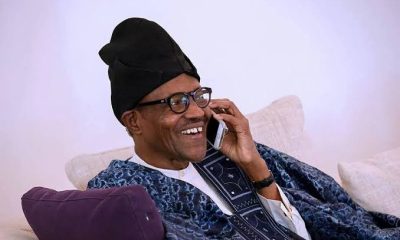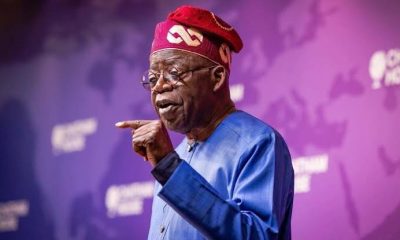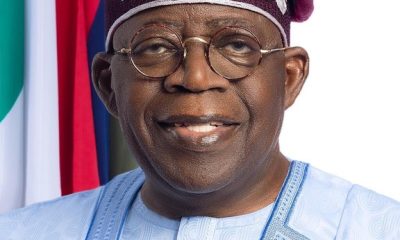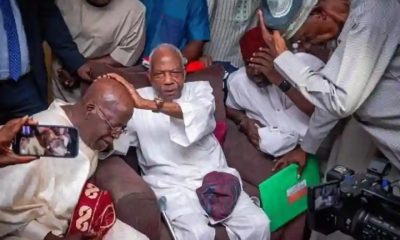News
Tinubu Calls For Strengthening Of Nigeria-EU Relations
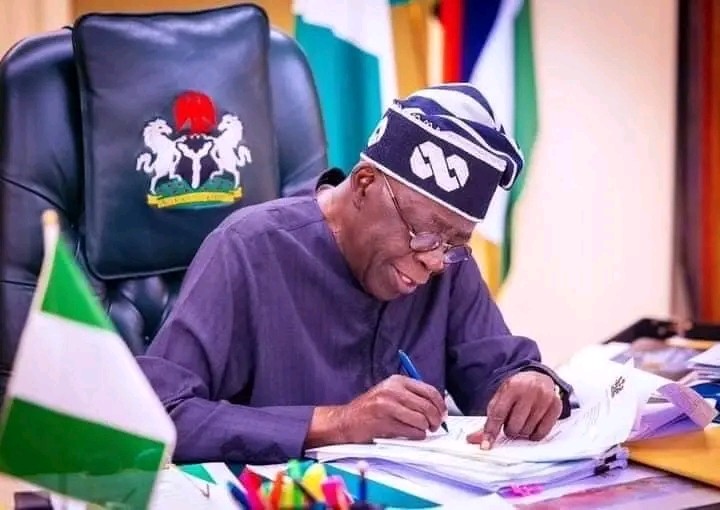
President Bola Tinubu on Thursday in Abuja called for the strengthening of cross-sectoral partnership between Nigeria and the European Union (EU) based on the principles of democracy, rule of law, and freedom.
Chief Ajuri Ngelale, Special Adviser to the President on Media and Publicity, who disclosed this, said Tinubu stated this when he received a delegation of the EU, led by Ms Jutta Urpilainen, EU Commissioner in charge of International Partnerships.
The President welcomed the signing of eight financing agreements between Nigeria and the EU, under the “EU Global Gateway in Nigeria,” at a separate event earlier in Abuja.
“Democracy is not an easy process, but we must fight for democracy and struggle for it to win at all times,” the President said.
Tinubu stressed the importance of economic cooperation with the EU in the areas of digital education, traditional energy, renewable energy, and broadband access.
He told the visiting delegation that Nigeria’s economy was going through several long-lasting reforms to render it capable of pulling millions of Nigerians out of poverty.
“We have a young and vibrant population, and we are determined to succeed. If we succeed, democracy succeeds. If we succeed, freedom succeeds.
“We need all of our partners’ hands on deck to sail together. We look forward to strengthening our partnerships,” he said.
In her remarks, Urpilainen commended Nigeria for playing a pivotal role as a key partner of the EU, not only in politics and economics, but also in shaping the social landscape across the African continent.
The EU Commissioner explained that over the past four years, the EU has been working to transform the nature of its relationship with Africa by shifting away from the traditional donor-recipient dynamic.
She said that the EU seeks to establish an equal and mutually beneficial partnership through the “Global Gateway” investment programme as a flagship example.
She noted that this strategy, agreed at the AU-EU Summit in Brussels last year, sets a goal of 300 billion Euros in investments, with 150 billion Euros allocated to Africa.
She thanked Tinubu for the important role Nigeria played in supplying key energy products during its standoff with Russia in recent times.
The EU Commissioner noted that the oil and gas partnership can be expanded, while adding that the “Global Gateway” strategy was designed to expedite the green and digital transformations in EU partner countries, with Nigeria standing as one of its most strategic.
”We are investing in critical infrastructure such as energy, transportation, and digital infrastructure, as well as in human capital, education, and research,” she said.
Other members of the EU delegation included Ms Samuela Isopi, Ambassador of the European Union to Nigeria and ECOWAS and Ms Rita Laranjinha, Managing Director of the Africa and European External Action Service (EEAS).
Others were Ms Lora Borissova, Africa Advisor, Cabinet of EU; and Ms Maria Pilar Palmero Vaquero, Head of Unit for Western Africa, Directorate-General International Partnerships (DG INTPA).
Headline
Prince Harry visits sick Nigerian soldiers in Kaduna

Prince Harry and his team visited the 44 Nigerian Army Reference Hospital in Kaduna to interact with wounded soldiers who are receiving treatment.
The Duke of Sussex is in Nigeria with his wife to champion the Invictus Games, which Harry founded to aid the rehabilitation of wounded and sick servicemembers and veterans.
Nigeria joined the Invictus Community of Nations in 2022 becoming the first African country to join.
Prince Harry’s visit to Kaduna came 68 years after his late grandmother Queen Elizabeth II visited the state during the time of the late Premier of Northern Region Sir Ahmadu Bello.




News
Senate approves death penalty for drug traffickers
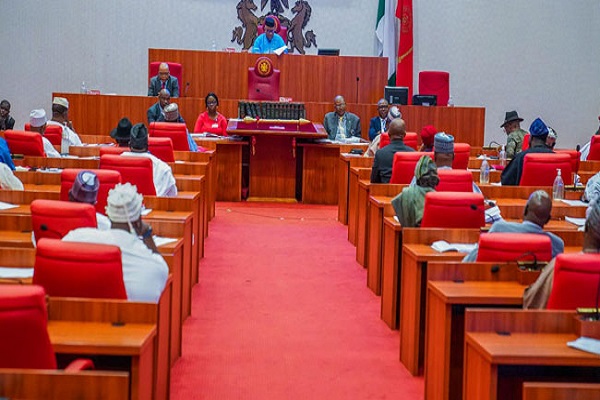
Senate on Thursday, May 9, approved the death penalty for those convicted on the charge of drug trafficking in the country.
The punishment prescribed in the extant NDLEA Act is a maximum sentence of life imprisonment.
The resolution of the Senate followed its consideration of a report of the Committees on Judiciary, Human Rights and Legal Matters and Drugs and Narcotics, National Drug Law Enforcement Agency (NDLEA) Act (Amendment) Bill, 2024.
The Chairman of the Committee on Judiciary, Human Rights & Legal Matters presented the report during plenary, Senator Mohammed Monguno (APC-Borno North).
The bill, which passed its third reading, aims to update the list of dangerous drugs, strengthen the operations of the NDLEA, review penalties, and empower the establishment of laboratories.
Section 11 of the current act prescribes that “any person who, without lawful authority; imports, manufactures, produces, processes, plants or grows the drugs popularly known as cocaine, LSD, heroin or any other similar drugs shall be guilty of an offence and liable on conviction to be sentenced to imprisonment for life” was amended to reflect a stiffer penalty of death.
Although the report did not recommend a death penalty for the offence, during consideration, Senator Ali Ndume moved that the life sentence should be upgraded to the death penalty.
During a clause-by-clause consideration of the Bill, Deputy Senate President Barau Jibrin, who presided over the session, put the amendment on the death penalty to a voice vote and ruled that the “ayes” had it.
But Senator Adams Oshiomhole objected to the ruling, saying that the “nays” had it.
He argued that matters of life and death should not be treated hurriedly, but Barau said it was too late, as he failed to call for division immediately after his ruling.
The bill was subsequently read for the third time and passed by the Senate.
-

 Headline5 days ago
Headline5 days agoPrince Harry visits sick Nigerian soldiers in Kaduna
-

 Entertainment5 days ago
Entertainment5 days agoAMVCA Cultural Day: BBNaija’s Neo, Venita win Best Dressed Male, Female
-

 Metro5 days ago
Metro5 days agoEx-Sports Minister laments after hospital neglected him for hours over N80000 deposit
-

 Headline5 days ago
Headline5 days agoEFCC bars dollar transactions, orders embassies to charge in naira



